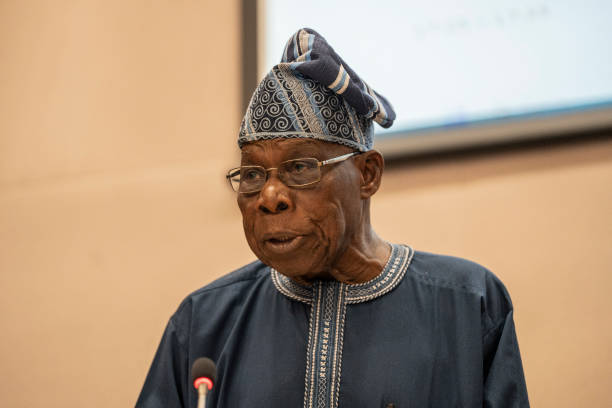Former President Olusegun Obasanjo has blamed Africa’s overreliance on foreign aid, poor leadership, corruption, and a flawed democratic system for the continent’s lack of progress.
Speaking on the state of the continent at the 32nd Annual Meeting of Afreximbank in Abuja yesterday, Obasanjo said Africa’s so-called ‘lions, its most populous and resource-rich countries have failed to achieve meaningful growth weighed down by systemic inefficiencies and misguided governance.
According to him, nations like Nigeria, Egypt, Ethiopia, the Democratic Republic of Congo, and South Africa ought to be leading the continent’s development charge given their demographic, resource, or economic strengths.
Instead, he pointed out that these countries have continued to record retarded growth.
While Egypt has made notable progress, he lamented that the others have either regressed or stagnated over the past three decades, often taking two steps forward and one step back.
He described these nations as ‘lions’ that are not moving economically or politically enough to uplift smaller or less endowed African states.
Obasanjo stated categorically that the potential for collective African progress remains dim unless these key countries begin to show meaningful growth and leadership.
He argued that Nigeria, in particular has immense potential but remains shackled by corruption, ignorance, and a persistent dependence on foreign assistance.
Obasanjo criticised the prevailing trend among African leaders of seeking foreign loans and aid instead of harnessing the continent’s internal wealth and capacity.
“We all rush to China to borrow $20 billion, yet one African country alone has the capacity to generate that kind of money domestically. But we won’t because we’re addicted to foreign help. That is not how we will move forward,” he said.
He blamed this failure on a fundamental lack of economic literacy among African leaders, arguing that many do not grasp the workings of the global economy and are therefore ill-equipped to position their countries competitively.
“How much of the world do our leaders even understand, If we understand it, we will get things right not just nationally, but at the community, subregional, and continental levels,” he said.
In addition to economic concerns, Obasanjo said the Western liberal democracy inherited from colonial powers has not delivered the governance outcomes Africa needs.
He described democracy on the continent as being reduced to ‘monetocracy’, a system where money determines leadership and criticised the winner-takes-all mentality that leaves opposition parties disenfranchised and democratic processes hollow.
“We must interrogate this borrowed system and reimagine a governance structure that works for us, one rooted in our realities, values, and aspirations,” he said.
He called for urgent and deeper collaboration among African leaders, noting that unity and cooperation are essential to tackle cross-border challenges and drive meaningful development.
He also emphasised the need for a continental agricultural revolution, citing Ethiopia’s success in wheat production as a model for the rest of Africa.
“If Ethiopia can transform itself into a wheat-exporting country, so can others. That’s the kind of story we need to replicate continent-wide,” he stated.
Obasanjo projected that Africa could save at least $40 billion annually if it achieved food self-sufficiency.
He urged governments to prioritise investment in agriculture, not just for economic gain but also to ensure food security, reduce import dependence, and generate employment for millions.
He further stressed the need to strengthen intra-African trade by adopting local currencies for transactions.
According to him, reducing the continent’s dependence on the U.S. dollar in trade would bolster regional economic resilience and promote African financial sovereignty.
In addition, Obasanjo also urged African leaders to embrace transformative reforms.
“We need bold action, internal reflection, and the political courage to change the systems that are failing us. Until the lions begin to move, the rest of the continent will remain stuck in place,” he said.







